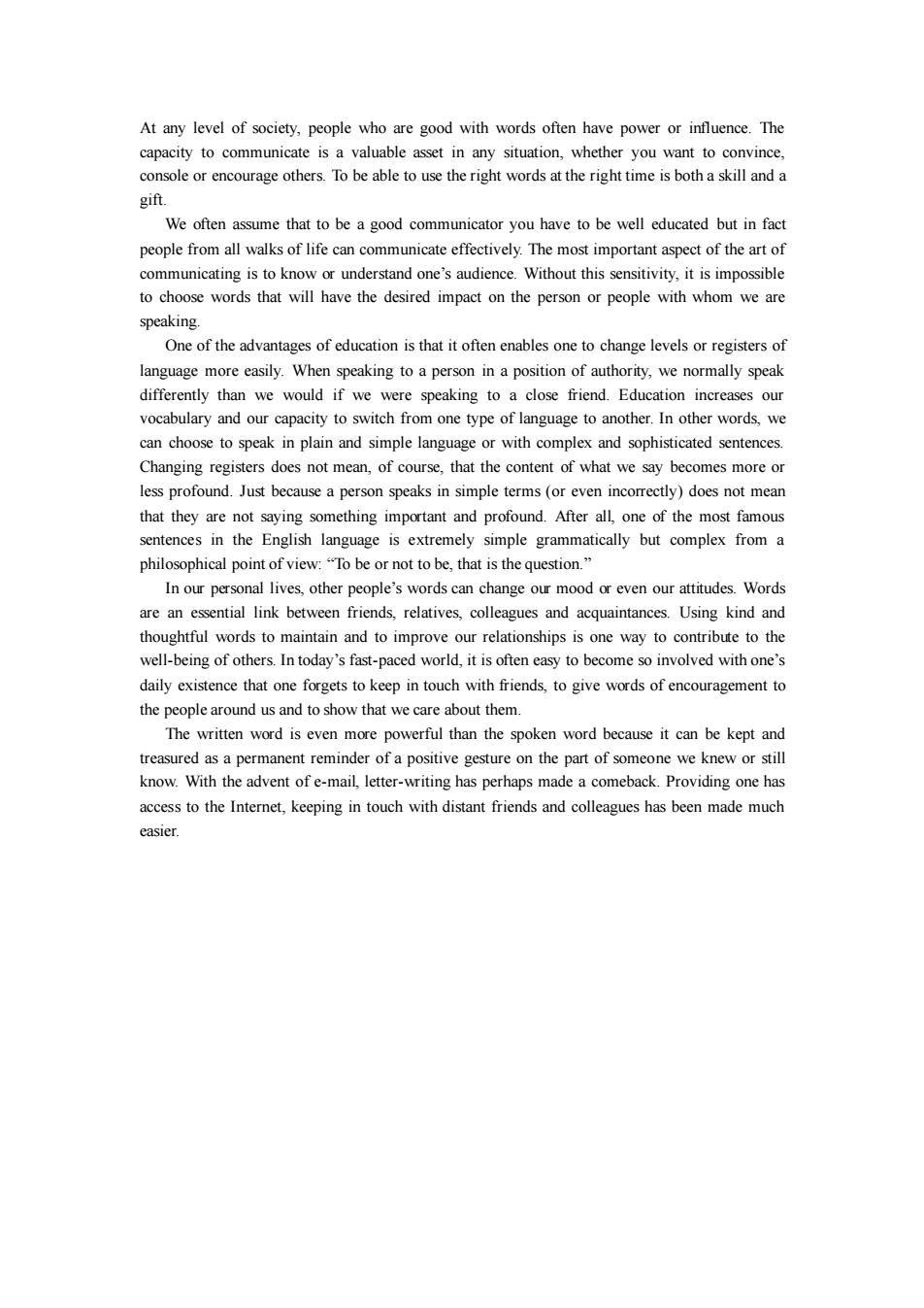
At any level of society,people who are good with words often have power or influence.The capacity to communicate is a valuable asset in any situation,whether you want to convince, console or encourage others.To be able to use the right words at the right time is both a skill and a gift. We often assume that to be a good communicator you have to be well educated but in fact people from all walks of life can communicate effectively.The most important aspect of the art of communicating is to know or understand one's audience.Without this sensitivity,it is impossible to choose words that will have the desired impact on the person or people with whom we are speaking. One of the advantages of education is that it often enables one to change levels or registers of language more easily.When speaking to a person in a position of authority,we normally speak differently than we would if we were speaking to a close friend.Education increases our vocabulary and our capacity to switch from one type of language to another.In other words,we can choose to speak in plain and simple language or with complex and sophisticated sentences. Changing registers does not mean,of course,that the content of what we say becomes more or less profound.Just because a person speaks in simple terms(or even incorrectly)does not mean that they are not saying something important and profound.After all,one of the most famous sentences in the English language is extremely simple grammatically but complex from a philosophical point of view:"To be or not to be,that is the question." In our personal lives,other people's words can change our mood or even our attitudes.Words are an essential link between friends,relatives,colleagues and acquaintances.Using kind and thoughtful words to maintain and to improve our relationships is one way to contribute to the well-being of others.In today's fast-paced world,it is often easy to become so involved with one's daily existence that one forgets to keep in touch with friends,to give words of encouragement to the people around us and to show that we care about them. The written word is even more powerful than the spoken word because it can be kept and treasured as a permanent reminder of a positive gesture on the part of someone we knew or still know.With the advent of e-mail,letter-writing has perhaps made a comeback.Providing one has access to the Internet,keeping in touch with distant friends and colleagues has been made much easier
At any level of society, people who are good with words often have power or influence. The capacity to communicate is a valuable asset in any situation, whether you want to convince, console or encourage others. To be able to use the right words at the right time is both a skill and a gift. We often assume that to be a good communicator you have to be well educated but in fact people from all walks of life can communicate effectively. The most important aspect of the art of communicating is to know or understand one’s audience. Without this sensitivity, it is impossible to choose words that will have the desired impact on the person or people with whom we are speaking. One of the advantages of education is that it often enables one to change levels or registers of language more easily. When speaking to a person in a position of authority, we normally speak differently than we would if we were speaking to a close friend. Education increases our vocabulary and our capacity to switch from one type of language to another. In other words, we can choose to speak in plain and simple language or with complex and sophisticated sentences. Changing registers does not mean, of course, that the content of what we say becomes more or less profound. Just because a person speaks in simple terms (or even incorrectly) does not mean that they are not saying something important and profound. After all, one of the most famous sentences in the English language is extremely simple grammatically but complex from a philosophical point of view: “To be or not to be, that is the question.” In our personal lives, other people’s words can change our mood or even our attitudes. Words are an essential link between friends, relatives, colleagues and acquaintances. Using kind and thoughtful words to maintain and to improve our relationships is one way to contribute to the well-being of others. In today’s fast-paced world, it is often easy to become so involved with one’s daily existence that one forgets to keep in touch with friends, to give words of encouragement to the people around us and to show that we care about them. The written word is even more powerful than the spoken word because it can be kept and treasured as a permanent reminder of a positive gesture on the part of someone we knew or still know. With the advent of e-mail, letter-writing has perhaps made a comeback. Providing one has access to the Internet, keeping in touch with distant friends and colleagues has been made much easier